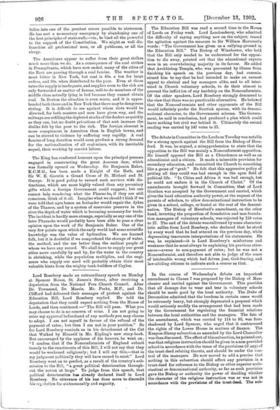The debate in Committee in the Lords on Tuesday was
notablo for a strong speech against the Bill from the Bishop of Here- ford. It was, he argued, a misapprehension to state that the opposition to the Bill was mainly a Nonconformist opposition. He himself opposed the Bill as a Churchman as well as an educationist and a citizen. It made a miserable provision for secondary education, and committed the Church to something like a game of "grab." He felt that this aggressive policy of getting all they could was bad enough in the open field of political life. "In China and Africa it was bad enough, but he could not endure it in the Church of Christ." Of the amendments brought forward in Committee, that of Lord Goschen was accepted by the Government and carried, which gives the local education authority power, at the request of the parents of scholars, to allow denominational instruction to be given in a school, college, or hostel at the cost of the denomi- nation. The Bishop of Hereford's amendment, on the other hand, inverting the proportion of foundation and non-founda- tion managers of voluntary schools, was rejected by 158 votes to 27. The end of the debate was enlivened by some character- istic sallies from Lord Rosebery, who declared that he stood by every word that he had uttered on the previous day, while deprecating inaccurate interpretations of his statements. Ho was, he explained—it is Lord Rosebery's misfortune and weakness that he must always be explaining his previous utter- ances—averse to non-payment of rates ; but he was not a Nonconformist, and therefore not able to judge of the sense of intolerable wrong which had driven just, God-fearing, and law-abiding citizens to indicate such a course as that.


















































 Previous page
Previous page